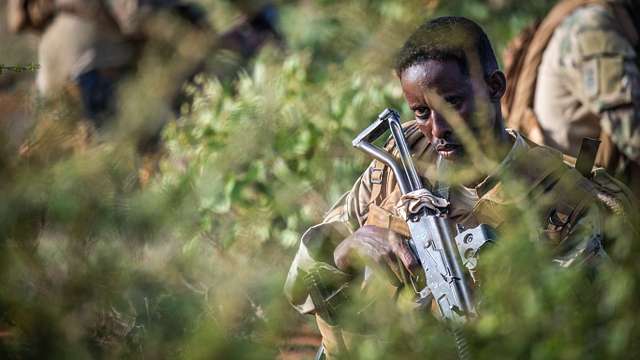Expanding U.S. Counterterrorism in Somalia Is Necessary but Insufficient
The recent redeployment of U.S. troops won't change the security landscape of Somalia, but it could provide an opportunity for change.

Published by The Lawfare Institute
in Cooperation With

Editor’s Note: Al-Shabaab, the al-Qaeda-aligned militant group in Somalia, has a strong presence throughout the country and, in recent years, has increased its efforts to target the United States. Tricia Bacon of American University assesses how recent U.S. military and counterterrorism changes are likely to affect al-Shabaab and argues that they will hinder the group but not fundamentally shift the balance in the country. Negotiations, she argues, should at least be considered despite their real risks.
Daniel Byman
***
In May, Somalia gained a new president as well as a bolstered U.S. commitment to counterterrorism against al-Qaeda’s strongest affiliate, al-Shabaab. On May 15, Hassan Sheikh Mohamud was elected president for the second time, returning to the office he held from 2012 to 2017. On May 16, it was reported that the United States had decided to (re)reposition several hundred of the troops stationed in East Africa back in Somalia, partially reversing a decision made in the waning days of the Trump administration to pull all U.S. troops out of Somalia. The move marks a shift from the previous practice, since January 2021, of U.S. troops “commuting” to Somalia from neighboring countries for short-term deployments. In addition, the United States has expanded its policy on drone strikes in Somalia from being used only to defend partner forces facing an immediate threat to also targeting about a dozen al-Shabaab high-value targets.
These are positive steps, but they are modest when considering the scope of the challenges. Mohamud’s administration will be more committed to countering al-Shabaab than his predecessor, under which al-Shabaab thrived as the government descended into infighting and power grabs. The full-time presence of a few hundred U.S. troops will mostly increase the effectiveness of a Somali special operations unit known as Danab, which has had some operational successes against al-Shabaab, and help protect the unit from being used as an instrument in political wrangling. The expansion of drone strikes also puts at least some pressure on al-Shabaab. Though drone strikes are controversial and can inflict harm on civilians, the limited strikes in Somalia under the Biden administration until this point have given al-Shabaab more breathing room at a time when broader conditions favored the group. In fact, in a study I conducted in 2021, I found that one of the only things that al-Shabaab feared was drone strikes. Even the threat of drone strikes may make al-Shabaab more hesitant to mass forces to attack African Union or Somali forces, a tactic it used to lethal effect in early May. The limited escalation of the Biden administration’s revised policy will be insufficient to change the security landscape of Somalia, but it may provide an opening for other approaches—including dialogue with al-Shabaab itself.
A Band-Aid on a Bullet Wound
Unfortunately, these developments come when the situation is perilous. Mohamud inherits a political system that al-Shabaab has thoroughly penetrated. It has infiltrated everything from federal government agencies, to all business sectors, to Somali society overall. Even the Somali intelligence service has been badly compromised.
Mohamud has also been left a system ravaged by political dysfunction, not least of all the bitter political feuds from the previous administration about the distribution of power between the federal and state levels in the Somali system. The cohesion of security forces has also been damaged, and the broader security sector is in disarray. While many welcomed Mohamud’s return, the extended and corrupt election process that brought him to power has done little to improve the legitimacy of the Somali government.
In contrast, al-Shabaab runs a shadow government with relative efficiency. Its court system offers a reliable avenue for mediation, providing a valuable service to Somalis. Although it relies on violent coercion, it also collects taxes effectively and even runs a budget surplus. And while the group has experienced its share of internal upheaval in the past, it appears to be maintaining cohesion and unity, especially relative to its adversary.
And al-Shabaab is using that strength beyond Somalia. It has conducted multiple major attacks in Kenya, including against the U.S. military presence there. It also maintains a presence there, and its Kenyan cadre has become more capable of launching sophisticated attacks at home and abroad. Perhaps most alarmingly, in 2020, a Kenyan al-Shabaab operative was indicted for plotting to hijack an aircraft to conduct a 9/11-style attack in the United States.
An Opportunity for Dialogue
Although a more directly and fully U.S.-backed Danab and an increase in drone strikes is an improvement, sadly neither will make much difference given the current circumstances. Improved Danab operations and the elimination of a dozen senior al-Shabaab figures will not make a dent in al-Shabaab’s strategic position because the group’s influence is too thoroughly entrenched in southern Somalia.
Although al-Shabaab is recognized as al-Qaeda’s strongest affiliate, the international community, and the United States in particular, is unwilling to make the large investments needed to change the course in Somalia. Some states, like Qatar, pour money into the coffers of their preferred Somali political figures at the expense of broader institution building, but there is little appetite for the large-scale commitments—political, financial or military—that are needed to significantly weaken al-Shabaab. In addition, as dysfunctional as the Somali political system is, many elites are satisfied with the status quo, which can be individually lucrative. Without buy-in from elites, reforms are unlikely even if investment were more forthcoming. The main losers are the Somali civilians who are killed in al-Shabaab’s attacks, forced to pay its taxes, and receive little in the way of services or protection from the Somali government.
Although there is little hope for a military solution, especially given the limited resources the United States and other outside powers are willing to invest, the United States and other countries have been hesitant to engage in negotiations with al-Shabaab, especially after the disastrous outcome in Afghanistan. Some analysts have cautioned that the time is not right for negotiations when al-Shabaab is in such a position of strength and the political system is so badly compromised. Those cautions are fair and important to consider.
Conversely, though, even if negotiations started today, an actual settlement would still be a distant prospect, probably years down the road, if it materialized at all. But beginning the process of dialogue—or at least attempting to—under the new government could reveal important information about al-Shabaab and possibly even stoke internal divisions within the group. At present, at least, it is difficult to see how al-Shabaab’s fortunes will be reversed to make conditions more ripe for negotiations. The group may even gain more strength if, or more likely when, international donors turn their attention to other security priorities. A new government coupled with an uptick in pressure from the United States may be the best opportunity for the foreseeable future to initiate some kind of dialogue.





